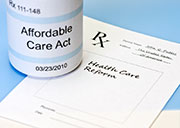- Could Your Grocery Store Meat Be Causing Recurring UTIs?
- Are You Making This Expensive Thermostat Error This Winter?
- Recognizing the Signs of Hypothyroidism
- 10 Strategies to Overcome Insomnia
- Could Artificial Sweeteners Be Aging the Brain Faster?
- Techniques for Soothing Your Nervous System
- Does the Water in Your House Smell Funny? Here’s Why
- Can a Daily Dose of Apple Cider Vinegar Actually Aid Weight Loss?
- 6 Health Beverages That Can Actually Spike Your Blood Sugar
- Treatment Options for Social Anxiety Disorder
2 Courts, 2 Different Decisions on Key Obamacare Provision


In a wild day for Obamacare, two federal appeals courts arrived at completely different conclusions Tuesday on the use of financial subsidies provided to millions of Americans who bought health insurance through the federal HealthCare.gov website exchange.
The conflicting opinions suggest that the matter is headed for a showdown in the U.S. Supreme Court.
In a 2-1 ruling, the U.S. Appeals Court for the District of Columbia Circuit said that the subsidies may only be provided to people who buy health plans in states that run their own health insurance exchanges.
“We reach this conclusion, frankly, with reluctance,” Circuit Judge Thomas Griffith wrote for the majority.
“At least until states that wish to can set up exchanges, our ruling will likely have significant consequences both for the millions of individuals receiving tax credits through federal exchanges and for health insurance markets more broadly,” he concluded.
In a dissenting opinion, Harry Edwards, a member of the three-judge D.C. panel, said, “This case is about appellants’ not-so-veiled attempt to gut the Patient Protection and Affordable Care Act.”
The lawsuit was filed by a group of individuals and employers in states that did not establish health exchanges. They maintain that the Internal Revenue Service erred in extending subsidies to people who bought health plans through the federally run exchange.
But in a separate ruling later Tuesday, the 4th U.S. Circuit Court of Appeals in Richmond, Va., upheld the IRS’s interpretation of the law.
Judge Roger Gregory wrote that “tax credits are essential to fulfilling the [Affordable Care] Act’s primary goals and that Congress was aware of their importance when drafting the bill.” He also noted that “the economic framework supporting the Act would crumble if the credits were unavailable on federal exchanges.”
The subsidies are a crucial piece of the Affordable Care Act, also known as Obamacare.
Thirty-six states chose not to create their own websites to sign up for insurance coverage under the Affordable Care Act. Many are headed by Republican governors who oppose the controversial law.
Of the more than 8 million people who signed up for an Obamacare health plan, more than 5 million selected a plan through the federal HealthCare.gov marketplace, according to a June report from the U.S. Department of Health and Human Services.
Eighty-seven percent of federal marketplace buyers selected plans with tax credits. Their premiums are 76 percent less than the full premium, on average, the report indicated.
The Affordable Care Act, often dubbed Obamacare, was passed by Congress in 2010 and requires virtually all Americans to have health insurance coverage or pay a penalty in the form of a tax. The law is particularly unpopular with Republicans, who view it as an unconstitutional intrusion by the federal government into individual rights.
Opponents of the law maintain that Congress never intended people who purchased plans in states that relied on the federally operated exchange to receive access to premium tax credits.
Andrew Kloster, a legal fellow at The Heritage Foundation, a conservative think tank in Washington, D.C., said the statute clearly directs subsidies “only to states that elected to set up insurance exchanges.” He said that D.C. appeals court’s decision “reaffirms that the administration cannot rewrite the health law that was passed, and it stops the Internal Revenue Service from doing the same.”
Families USA, a consumer advocacy group that supports the Affordable Care Act, said Tuesday’s decision by the D.C. jurists is not the final word.
“It will inevitably be placed on hold pending further proceedings,” said Ron Pollack, the group’s executive director.
More information
Visit the official federal government website for details on coverage under the Affordable Care Act.
Source: HealthDay
Copyright © 2026 HealthDay. All rights reserved.










